The term GI pipe refers to materials in construction, plumbing, or manufacturing. GI pipes, commonly known as galvanized iron pipes, have been used for several years now in a lot of applications. Tuspipe gives a brief description of the gi pipe full form, its importance, and why these pipes are still in demand in the market.
Understanding the Full Form of GI Pipe
GI pipe stands for galvanized iron pipe. ‘Galvanized’ means it is protected with a thin layer of zinc that by a special process is deposited on iron or steel. This coating reduces the implication of suffering from rust and corrosion which are real challenges when metal is exposed to water and air. This layer makes the GI pipes stronger and longer lasting and can therefore be used in various applications.
The Process of Galvanization
Galvanization is a very simple but efficient process. It encompasses immersing the steel or iron pipes into hot zinc metal. It sticks at the surface as a passive layer that will protect the base metal from undesirable factors. This process ensures that the pipe does not rust and corrode, even if it comes in contact with water, or any other humid place. There are two main types of galvanization: hot-dip galvanization and electro-galvanization. The most popular technique used in GI pipes is hot-dip galvanization. It produces a denser metallic zinc layer to give enhanced protection. At the same time, electro-galvanization uses a thinner layer of zinc through the electro-galvanizing process. However, this technique is less exercised due to its inflexibility but applied where thin film is adequate for the application.
Why GI Pipes Are Essential
GI pipes are appreciated for their high tensile strength and excellent corrosion resistance. In many industries, pipes often come into contact with water, air, and other elements, and so there is often wear and tear. If there is no coating layer, steel or iron pipes will rust and the pipes’ structure will be compromised and their life span shortened. This is solved by the use of galvanized iron pipes since they offer a long-term solution to projects that need the pipes. This protective zinc coating also makes the GI pipes to be low maintenance. This is unlike other materials, which would need to be used extensively in treatments to avoid corrosion, but GI pipes can last for several years without necessarily needing frequent treatments. This quality is especially valued in large-scale work, where the replacement or repair of pipes is expensive and takes a long time.
Applications of GI Pipes
GI pipes are highly flexible, and this is why they are used in almost all sectors. In residential construction, they are used in water supply systems and plumbing. Because they do not rust easily they are suitable for use in transporting water without affecting the quality or safety of the water.GI pipes are employed in irrigation in agriculture. They can ferry water without degrading it over a long distance, which guarantees good delivery to crops. They are sturdy and hence durable for use in fencing and other structural development on the farming firms. The construction industry uses GI pipes for erecting scaffolds and other structural requirements. Due to their durability and endurance of lifetime environmental tests, they are a valuable material for temporary and permanent structures. In industrial applications, GI pipes are employed to convey gases and other products. It is very important in such industries as chemical processing or food production where the contents of the containers cannot be allowed to come into contact with any form of corrosion.
A Comparison of GI Pipes with Other Materials
GI pipes are particularly strong, durable, and relatively cheaper than most other types of pipes. Though stainless steel pipes are also resistant to rusting, they are generally more costly than GI pipes and, hence, are preferred. Currently, more plastic materials such as PVC are cheaper and do not corrode, but they are not strong and do not withstand heat like GI pipes. In cases where the project needs both durability and cheapness, then GI pipes are the best to use. Because of their traits dealing with pressure, their immunity to harm, and their capability to span for years, they are preferred by numerous companies.
Conclusion
GI pipes, or galvanized iron pipes, are a testament to how simple innovations can solve complex problems. These products have a protective zinc coating which provides strength, durability, and resistance to rust, ideal for most purposes. They are used in plumbing, agriculture, construction, and industry, among other applications, and have been shown to deliver their promise repeatedly. Beginners need to understand the full form of GI pipes and the science behind galvanization to understand why these pipes remain popular. Their balance of performance, cost, and sustainability means they remain relevant in many projects across the globe.

